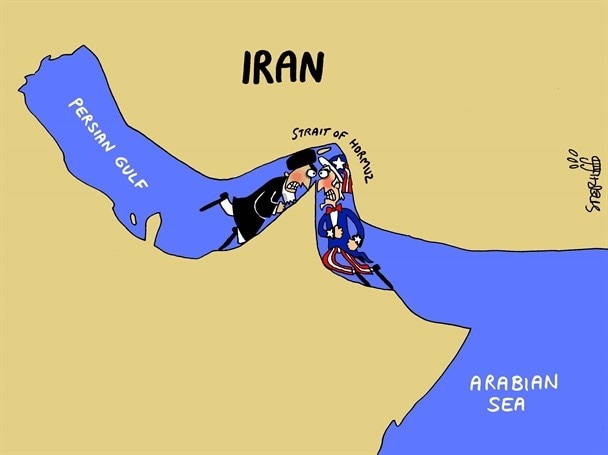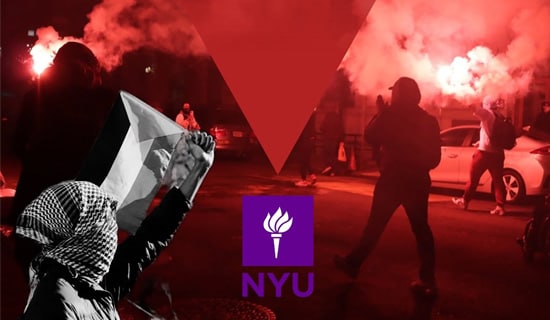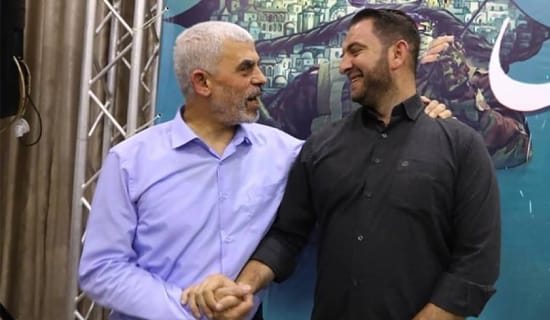Russian commentator Valery Shiryaev speculated on the possibility of another Middle East war, in an article published for Novaya Gazeta.
On July 4, Ismail Kowsari, an official representative of the Islamic Revolutionary Guard Corps, said that Teheran will completely cut off the transport of oil via the Strait of Hormuz if the US tries to prevent Iran from exporting its own oil.
According to Shiryaev, if Tehran will escalate the tensions a US-Iran Middle East war is possible. If this scenario materializes, Alexey Malashenko, chief researcher at the Dialogue of Civilizations research institute, predicts in the article that Russia will leave Iran to its own devices. "The Tehran-Ankara-Moscow triangle is even now something tenuous, almost mystical. And a conflict in the Gulf will put a de facto end to it," opined Malashenko.
Below are excerpts from Shirayev's article with commentary by Alexey Malashenko, chief researcher at the Dialogue of Civilizations research institute:[1]

'The Iranian Military Is Going To Act On Its Own Territory, Where Everything Is Easier'
"Ismail Kowsari, an official representative of the Islamic Revolutionary Guard Corps, said that Teheran will block all oil transport via the Strait of Hormuz if the Americans try to prevent oil imports from Iran.

Valery Shiryaev (Source: Novayagazet.ru)
"The Iranian armed forces have some experience in military confrontation with the Americans: during the Iran-Iraq War of 1980-88, the US fleet entered Iran’s territorial waters on the pretext of protecting shipping and the US Air Force entered its air space. In the course of that confrontation, the US shot down an Iranian civilian airliner by mistake; 290 people died, including 65 children.
"From the purely military perspective, the situation has changed considerably over the past 30 years. Recently, under the conditions of an economic and political blockade, Iran has used Chinese licenses and technologies to develop an entire family of quite modern self-produced short-range, medium-range, and even theater and tactical anti-ship missiles with a range capability of (at least) 30 to 200 kilometers.
"Their payload suffices to sink any civilian vessel or force most warships of any fleet in the world out of action. Some gather speed which exceeds the speed of sound fivefold at the last stage (when approaching the ship), and even the American fleet will find it hard to shoot them down. This is quite different from what prevailed in 1988.
"Of course, a discerning reader will point out that the American army has also immeasurably increased its strength since then, and that its shipborne antimissile defense allows it to defend itself from hi-tech weapons. All this is true. But the Iranians, according to their declared political goal, are going to threaten not the ABMs on American destroyers, but defenseless oil tankers.
"The Iranian military is going to act on its own territory, where they have the 'home court advantage': geography itself is on their side, and it largely nullifies the advantages of the sophisticated American weaponry. Everyone who has fought in Afghanistan knows the situation when one heavy machine gun in a mountain path can hold off a division.
"The Strait of Hormuz is 54 km wide in its narrowest part; this is less than the range of guns from the Krasnaya Gorka fort, which was crucial for the defense of Leningrad.
"But the navigable part of the Strait is even narrower — 10 km. And there are two sections where it is only three kilometers. That is, all types of Iranian anti-ship missiles can fly through it. It is enough to send to the bottom two supertankers (length over 230 m, height up to 50 m) in a well-chosen spot, and the world may experience a fuel collapse.
The 'Guerrilla-Style Anti-Ship Defense'
"The List Of Iranian Anti-Ship Missiles (ASM)
"ASM Ghader
The most modern missile in Iran; range of fire – up to 160 km, weight – 715 kg
SUPPORT OUR WORK

"ASM Nasr ('Victory')
A very light missile, designed to strike small moving targets; range – up to 35 km, weight – 300 kg
"Khalij Fars ('Persian Gulf')
Supersonic anti-ship ballistic missile; range – up to 300 km, weight – 3500 kg
"ASM Zafar ('Success')
A light, short-range missile, to be launched from high-speed powerboats
"ASM Saeque ('Lightning Strike')
Range – up to 300 km, medium weight
"ASM Tondar ('Thunder')
Supersonic gas turbine ballistic missile
"ASM Qader ('Capable')
Range – up to 200 km, medium weight
"These missiles are produced on a mass scale. They are packed in shipping containers, concealed in trucks of various commercial companies. These launchers are very hard to distinguish from ordinary long-haul trucks. They can move quickly and inconspicuously in the traffic flow along coastal roads, including country routes. And their launch zone is the entire north coast of the Persian Gulf. One can call it guerrilla-style anti-ship defense.
"During the Iran-Iraq war, young Fedayeen wrapped in white robes of the dead cleared paths in the minefields of Saddam Hussein’s army with their bodies, shouting 'Allah akbar, Khomeini rahbar [God is great; Khomeini is our leader]'. Traditions of sacrifice will be quickly revived, especially if one starts a war with the US: they are still in their blood. Undoubtedly, the launch stations for Iranian anti-ship missiles will be based in densely populated city centers. And the launches may be expected from populated places.
"The confident opinions one can see on social networks that the American fleet and air force will quickly crush Iran stem from ignorance.
"It is almost impossible to do without a full-scale operation like Desert Storm. And one will have to bomb cities.
"Oil supplies from the Persian Gulf have colossal importance for the world economy. A Western expert only has to write 'the Gulf', and the readers will immediately understand what gulf is meant. I have described the opinion of the military above, but their calculations thankfully, often remain only on paper. This is because politicians have other considerations.
Russian Expert Malashenko: It is Hard To Say Whether Iran Is Bluffing; 'The Tehran-Ankara-Moscow Triangle Is Even Now Something Tenuous, Almost Mystical'
"[Alexey Malashenko, chief researcher, Dialogue of Civilizations research institute commented:] It is very hard to say whether Iran is bluffing when threatening to cut off oil supplies from the Gulf, or not. The Iranians are unpredictable people, and they don’t only have politicians, but also the Revolutionary Guard Corps and radical Islamists, even though they are Shiites. They like risk-taking, and the world knows that the Iranians already took risks before; they went on a direct confrontation with the US and even captured their embassy. So I cannot rule out a confrontation with a 100% certainty.

Alexey Malashenko (Source: Business-gazeta.ru)
"What can the Americans do in response? Strike Iran? It is a great risk, fraught with a great deal of trouble, even for the current resolute president. And the Iranians are playing upon this. Various totally unexpected scenarios are possible, including even a limited military conflict. An incident, as the politicians used to say in the past.
"It does not mean a full-scale war will take place. But the Americans have to respond in some way, to show that they are not afraid of any Iran, but at the same time are capable of behaving judiciously. If the impulsive Trump is pushed to the limit, some armed conflict is possible. This will be highly regrettable.
"There is one critical factor— all this is taking place practically on the Saudi Arabian border. How will it react? What will it do? The monarchy is in the crosshairs of Iran; an indirect threat to the Saudis will arise. They will not remain silent and, of course, will express solidarity with the Americans. It is still hard to say how the conflict will develop in this area, what statements and steps will be made. But the situation will not return to the current level of tension.
"All this will undoubtedly have an impact on the general situation in the world, and will hurt Russia to a certain degree.
"Whatever relationship Russia has with Iran (and it is not trouble-free), Trump will inevitably pose the question to Putin: with whom is Russia actually cooperating?
"[Is it] with an absolutely irresponsible state, which is ready for such barbaric steps and has been preparing for them in advance. Soon we will hear many statements of this kind.
"Paradoxically, Iran is modifying the Soviet experience in its own way. Our missiles were transported by railway, disguised as civilian trains. And during Operation Anadyr (deploying our troops to Cuba during the Cuban Missile Crisis), our weaponry was disguised as peaceful cargo, and the troops had to wear checkered shirts and were not allowed to leave their holds below deck.
"This sharp escalation, of course, will ricochet on Syria. The Tehran-Ankara-Moscow triangle is even now something tenuous, almost mystical. And a conflict in the Gulf will put a de facto end to it. The politicians will inevitably say: look, Bashar Assad is supported by some trigger-happy adventurists.
"I think that our propaganda will not be stopped. But all the other actors involved in the conflict must pause, come to their senses, look around and only then make any decisions and express their stance. The Iranians have put both the Americans and the Europeans in a tight spot.
"After all, the Europeans are rather favorably disposed towards Iran. Five out of the six parties that signed the agreement with Tehran about its nuclear program still remain, including Russia. But as always, Iran, which has declared (even though not on the highest level) a possible blockade of the Strait of Hormuz, does something unexpected. And forgive me such unparliamentary language, everyone will now be scratching their heads.
"I personally do not believe that this declaration was the initiative of Rouhani and his team. This proves that fundamentalists, whichever name you call them, are growing in strength again in Iran, which is very sad.
"Look at Iran’s recent history: first a radical conservative is at the helm, then a moderate; Khatami, then Ahmadinejad, then Rouhani… Who do you think will win in this internal fight under the conditions of an armed conflict, even a limited one?
"I do not predict a real military operation by the US along the lines of Desert Storm, with troop landings. I am 90%, even 95% certain this will not happen. But then, nobody predicted the Islamic Revolution in Iran. Nobody predicted Ahmadinejad’s behaviour.
"People in Iran are very emotional. If the Iranians started something, they must go on; they do not stop halfway. How will this need be translated into reality? I think it is conceivable that in a while, there will be a critical situation with a specific ship, for example.
"US military power is great. But I think the Americans are not ready to bomb cities. Whatever their attitude to Iran, it is not an Islamic state, it is something else. Despite all the anti-Iranian rhetoric of the US, and the Shiite-Sunni clashes in the region where many would be happy to see such bombings, they may provoke a very negative reaction in the Middle East, the world, and the US itself. I really would not want to see that, but if it comes to bombing, even a terrorist response against the Americans is possible. And the situation will worsen even more."

Strait of Hormuz Standoff (Source Daily Star.lb)
[1] "Is Another War in the Middle East Possible? Iran has threatened to block the Persian Gulf and shut off oil supplies. What is its arsenal? What will be the consequences? Commentary by Alexey Malashenko", subtitle "Enchanting is Hormuz in clear weather. Any missile can fly to its middle (An allusion to a famous passage from Gogol: "Enchanting is the Dnieper in tranquil weather… A rare bird can fly to the middle of the Dnieper"), by Valery Shiryaev. Novayagazeta.ru, July 7, 2018.




